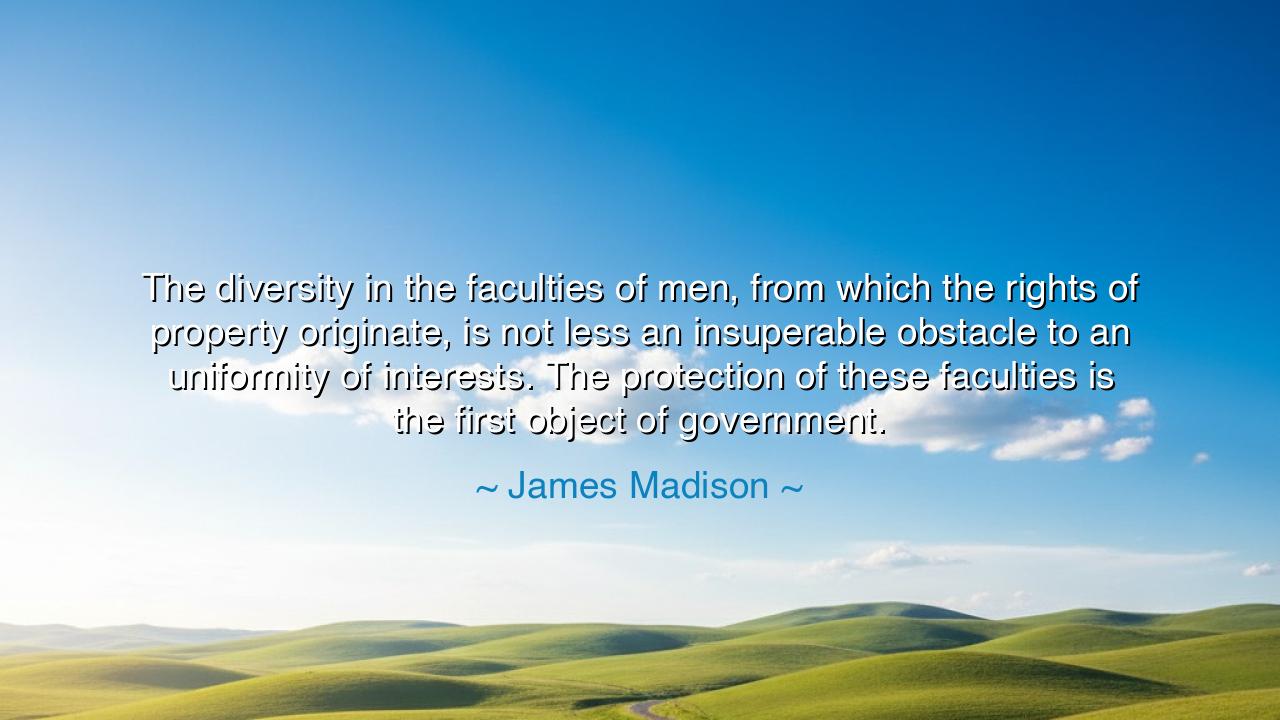
The diversity in the faculties of men, from which the rights of
The diversity in the faculties of men, from which the rights of property originate, is not less an insuperable obstacle to an uniformity of interests. The protection of these faculties is the first object of government.






When James Madison wrote, “The diversity in the faculties of men, from which the rights of property originate, is not less an insuperable obstacle to an uniformity of interests. The protection of these faculties is the first object of government,” he spoke as the philosopher-architect of liberty, one who saw deep into the soul of human society. These words, drawn from his immortal Federalist No. 10, reveal his vision of a world in which diversity, not uniformity, is the foundation of freedom. Madison understood that men differ in talent, virtue, strength, and ambition — and that from these differences flow the natural inequalities of wealth, status, and interest. The purpose of government, then, is not to erase these differences, but to protect them, ensuring that each man’s effort and faculty may bear its rightful fruit under the shelter of justice.
The origin of this quote lies in the crucible of the American founding. Madison, a student of both philosophy and history, had studied the rise and fall of republics from Athens to Rome, and he saw that the greatest danger to free societies came not from kings, but from factions — groups of citizens united by passion or interest, ready to trample the rights of others. In Federalist No. 10, written in 1787, he argued that the diversity of human faculties — the ability of one man to invent, another to lead, another to labor — naturally produced different economic outcomes. These differences, he said, would inevitably create conflicting interests. And since it is impossible to make men equal in talent or fortune without destroying their liberty, the true task of government is to restrain injustice, not to enforce equality.
In the style of the ancients, Madison’s wisdom echoes the teachings of Aristotle, who warned that envy, when weaponized by democracy, could destroy both wealth and virtue. Madison’s insight stands upon the same moral bedrock: that human society is a tapestry woven from unequal threads, and that to pull them all to the same length is to tear the cloth apart. The ancients knew that harmony does not mean sameness, but balance — that the just ruler preserves the strong without oppressing the weak, and uplifts the poor without punishing the industrious. Thus, Madison’s words are not cold logic, but a hymn to divine diversity, a recognition that liberty itself is born from the differences that make mankind rich in mind, spirit, and endeavor.
History, again and again, has shown the peril of forgetting this truth. Consider the tragedy of the French Revolution, which began with the cry for equality but ended in blood. When the revolutionaries sought to erase all distinctions of class and property, they destroyed not privilege but prosperity, not tyranny but liberty. In their fury to make all men equal in outcome, they enslaved the very faculties that made men free — enterprise, creativity, and individual excellence. What Madison understood — and what the French revolutionaries forgot — is that to level every man is to destroy the very energy that sustains civilization. The government that truly serves its people is not the one that divides the spoils of envy, but the one that guards the sanctity of effort and rewards merit with justice.
And yet, Madison’s wisdom carries not arrogance but moral humility. He does not glorify wealth or rank, but recognizes that the rights of property — the right to the fruit of one’s labor — is the natural extension of human diversity. A man’s property is his freedom made tangible. To violate that right is not only to steal his possessions but to deny his individuality, his creativity, his life’s purpose. Thus, the first object of government is not charity, but protection — to safeguard the conditions in which every citizen, rich or poor, can labor without fear, speak without oppression, and prosper by the strength of his own faculties.
Madison’s insight also serves as a rebuke to both tyranny and apathy. When governments forget their true purpose — when they seek to manipulate human nature rather than protect it — they sow the seeds of decay. Likewise, when citizens demand equality of result rather than equality before the law, they invite the rule of mediocrity. In both cases, the flame of liberty begins to dim. But when people respect diversity of talent and cherish the fairness of law, they build societies that endure, just as the American Republic — born of Madison’s thought — has endured through war, crisis, and change.
The lesson of Madison’s teaching is timeless and profound: freedom thrives when difference is honored and justice is impartial. Do not envy the gifts of others, but refine your own. Do not seek to destroy inequality by force, but to uplift opportunity through fairness. Let government stand as the impartial guardian of all, neither favoring the powerful nor appeasing the envious. For the health of a nation lies not in uniformity, but in unity through diversity, where every man’s labor, every woman’s mind, and every soul’s virtue are free to shine.
Thus, let Madison’s words echo like an ancient oracle to the generations that follow: a just government does not make men equal; it makes them free. Protect, therefore, the diversity of faculties, for in them lies the destiny of civilization. And remember always that when liberty guards the strong and justice shields the weak, the republic endures — radiant, balanced, and everlasting.






AAdministratorAdministrator
Welcome, honored guests. Please leave a comment, we will respond soon